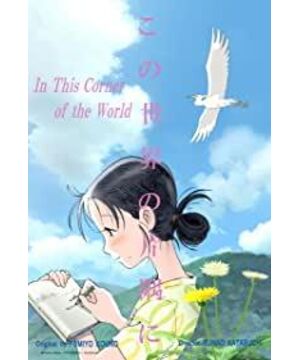It is rare and rare to use such warm and restrained language to express ordinary people who are struggling in the war. The innocent and kind heroine Ling, the husband Zhou Zuo who always protects Ling, the self-improving, self-loving and capable sister Jingzi, the simple villagers who support each other, the grateful Ling who has been reduced to the fireworks willow alley in troubled times... They have experienced countless pains, But always being able to laugh at life again, not forgetting to be kind to others while keeping one's own place, and never giving up on loving and being loved, this is simply a fairy tale in a cruel war. In such a beautiful corner of the world, with such a beautiful group of people, so many tragic things have happened. What is the culprit? Of course it's war. Many people criticize the film's stance on war as having problems, I really can't agree with it. Where the protagonist lives, air defense alarms are raised every three times, and there is an extreme shortage of supplies and food. The military police suspect that he is a spy when he draws a picture on the side of the field. He witnesses the displacement of people around him and the loss of their relatives. Just imagine, people living in such an environment do not desire peace from their hearts? No disgust and fear of war? The film does not wave the flag and shout its anti-war stance, but secretly accuse everyone of the pain and suffering brought by the war all the time. There are also many details that express the views of the people at the bottom of the war on war: 1. When Suzu was painting a picture of a bunny jumping across the sea, she said to Tetsu Mizuhara, "I'll leave my brother to you." Tetsu Mizuhara immediately He said, "Don't. We boys have rules. When you see your brother, you should run away (maybe because his brother likes to bully people, so he was pushed out by everyone)." But he immediately said, "But it's probably better than going to the naval school. The brother who died in the sea is much better." 2. After Suzu married into Hojo's house, she cleaned the room with her mother-in-law and found out her old sister's dress. My mother-in-law recalled, "At that time, it was still a peaceful and prosperous world. In order to protect the peace, the army had to be cut. Your father-in-law and many people nearby lost their jobs because of this... At that time, I felt that the sky was falling, and I really missed the days when I was worried about the little things. .” The subtext of this sentence is: Now (war time) is much more painful than then (peace time) - losing their jobs is of course a matter of survival for these villagers, but with the wartime faced Compared with the difficulty of survival, it is really nothing. 3. Ling Suihua fleet was seen by the military police, and was immediately taken home to confirm his identity, and was considered a spy. The military police said in a loud and stern tone, (Lin) looks honest, but in fact he doesn't know what insidious plan he is planning. There is also speculation that Ling may use her husband's identity to steal military secrets, while her sister and mother-in-law desperately hold back their laughter. After Zhou Zuo and his father-in-law came back, everyone laughed even more, laughing at the stupidity of the army military police for treating such a simple girl as a spy. It can be inferred from this matter that the public is monitored by the gendarmerie. If someone really expresses anti-war sentiment or ideological hostility in public, they will be "checked the water meter"; Laughing out loud together, it satirized how absurd and unreasonable the existence that represented Japan's political ideology was. 4. Ling and Obasan heard the Emperor's Jade Sound on the radio. At this time, Ling said that he could not accept the surrender, and said angrily, wasn't this a matter of consciousness from the beginning? Didn't he say that he would fight to the last person... After that, he ran to the field to draw water, and found his sister hiding and crying for her dead daughter. At this moment, Ling thought, our past has just vanished. All the things I thought reasonable in the past, the reasons I had to endure, were all gone. This is one of the most controversial expressions of war in the film. In my opinion, this monologue of Ling is precisely the most stark satire of war in the entire film. Why is Ling so angry and even unwilling to surrender? Her brother, niece, and parents died because of the war; because of the war, she almost lost her only place to live; because of the war, she had to separate from her husband and shoulder the responsibility of guarding a family; because of the war, she was afraid every day, My heart is broken for the firewood, rice, oil and salt, and I have seen life and death in the world, and I just want to work hard to live. The emperor only needs to say surrender, and she, all the sacrifices, sufferings, all the deaths of her relatives, for what? The beliefs and pillars she used to paralyze her collapsed at this moment. ——You said that we will fight to the end, so we have this kind of awareness: even if there is no food, we will go to find wild vegetables to feed our hunger; even if we lose our shelter, we will survive in the air raid shelter; even if we lose our relatives and friends And loved ones, we too will be reinvigorated. Ling and Obasan heard the Emperor's Jade Sound on the radio. At this time, Ling expressed that he could not accept the surrender, and said angrily, wasn't this a matter of consciousness from the beginning? Didn't he say that he would fight to the last person... After that, he ran to the field to draw water, and found his sister hiding and crying for her dead daughter. At this moment, Ling thought, our past has just vanished. All the things I thought reasonable in the past, the reasons I had to endure, were all gone. This is one of the most controversial expressions of war in the film. In my opinion, this monologue of Ling is precisely the most stark satire of war in the entire film. Why is Ling so angry and even unwilling to surrender? Her brother, niece, and parents died because of the war; because of the war, she almost lost her only place to live; because of the war, she had to separate from her husband and shoulder the responsibility of guarding a family; because of the war, she was afraid every day, My heart is broken for the firewood, rice, oil and salt, and I have seen life and death in the world, and I just want to work hard to live. The emperor only needs to say surrender, and she, all the sacrifices, sufferings, all the deaths of her relatives, for what? The beliefs and pillars she used to paralyze her collapsed at this moment. ——You said that we will fight to the end, so we have this kind of awareness: even if there is no food, we will go to find wild vegetables to feed our hunger; even if we lose our shelter, we will survive in the air raid shelter; even if we lose our relatives and friends And loved ones, we too will be reinvigorated.
——You say you want to surrender now, so what did I pay in the past? What is my dead relative? What is the reason for me to endure so desperately and protect me so desperately? Likewise, why does my sister cry for her daughter at this time? Because she felt that her daughter died in vain.
——Since the war can be ended so easily, why not surrender sooner? That way there won't be so many sacrifices and the daughter won't die.
This is also the most real part of the film. The cognition and behavior of all characters are in line with their identities and status, and they are not detached from their era background. How do you let a bunch of villagers who are hard to know the real situation (from the animation, we can know from many details, the real battle situation is not public, and many people get the news is only a few words from relevant people, and then word of mouth) go Is it justice to reflect on the origins of this war? How do you let a group of people who don't even care about their own survival think about how many invisible and intangible people were killed with their support, and they were officially designated as "enemies"?
"In This Corner of the World" chooses such a small place and the story of a small person, trying to restore history and reflect on the war from a caring and rational perspective. You can say that it has a small format, is not atmospheric enough, and has not escaped the limitations of an era. But you have to speculate whether the director has ulterior motives, or wants all Japanese WWII-themed movies to admit their mistakes, which is a bit self-indulgent.
The director didn't fan the flames, and you lit the fire yourself. Some people are really flammable and explosive.
View more about In This Corner of the World reviews











